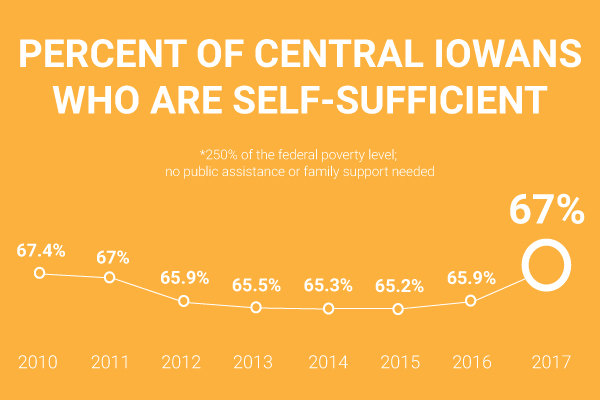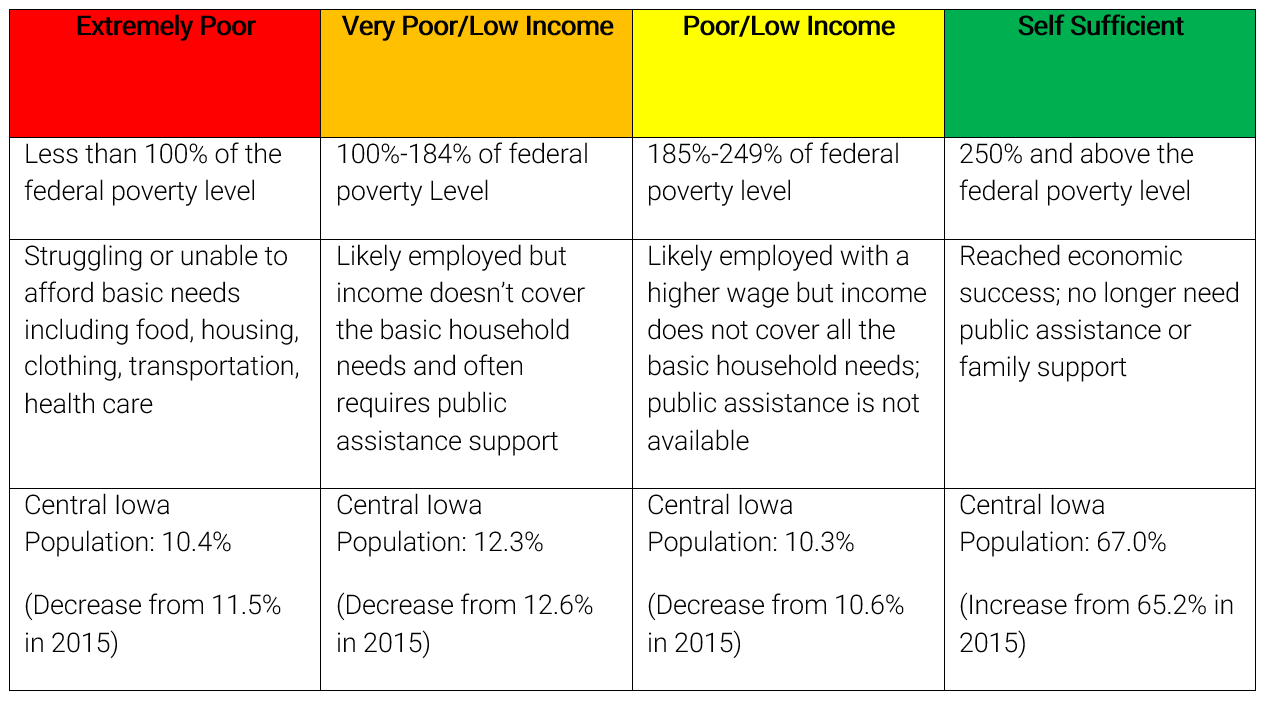More central Iowans are financially self-sufficient

The percentage of central Iowans who were financially self-sufficient increased to 67% in 2017, up 1.1% from the previous year and up 1.8% since 2015, according to the latest U.S. Census data released this December.
Since 2015, nearly 25,000 more central Iowans are financially self-sufficient.
“Our efforts as a community are working,” said Elisabeth Buck, president of United Way of Central Iowa. “After a six-year downturn, the number of families who are thriving in Polk, Warren, and Dallas Counties is increasing, and that especially means more children are having their basic needs met and are having greater opportunities for healthy development.”
The 2017 data, released by the U.S. Census Bureau, represents a five-year average from 2013-2017. United Way of Central Iowa follows this data to determine progress toward the community Goal for 2020: 75% of central Iowans will be financially self-sufficient. Last year, central Iowa had a 0.7% increase in the self-sufficiency rate from a low point of 65.2% in 2015. Even with a significant population increase of 21,935 individuals since 2015, the self-sufficiency rate has improved in central Iowa.
United Way of Central Iowa uses “The Cost of Living in Iowa” study from the Iowa Policy Project to define self-sufficiency as 250% of the federal poverty level. At this level, families can cover basic expenses, including food, housing, clothing, transportation, child care, and health care. As their income continues to rise, they can begin to save, pay loans, cover education expenses, and afford other items. U.S. Census data focuses on 100% of the federal poverty level (FPL), where most families struggle to afford critical basic needs.
In 2017, 4,245 fewer people in Polk, Dallas, and Warren counties were living below the federal poverty level than in 2015.
Changes include:
- The number of children (ages 18 and under) living below the FPL decreased to 13.9% of the population from 15.7% in 2015. This is a decrease of 1,952 children.
- The number of working age people living below the FPL decreased to 9.6%, or by nearly 3,000 people, from two years ago.
- The number of African Americans living below the FPL decreased to 28.9% of the population from 36.8% in 2015. This is a decrease of 1,347 individuals.
“These are significant improvements, especially for children and African Americans,” said Renée Miller, chief community impact officer at United Way of Central Iowa. “Since our community set a common goal and strategic plan for addressing poverty in 2014, we have started to make progress and will continue to work together to tackle the barriers that keep people in poverty, especially as central Iowans face rising costs in child care, health care, and housing.”
United Way of Central Iowa has invested in addressing the barriers that keep people from achieving financial stability through its OpportUNITY community plan and by helping adults acquire the training and education they need for better jobs. The percentage of students graduating from high school within five years increased more than 10 percentage points to 93.6% in 2017, moving us closer to our community's Goal for 2020 in Education, and the number of people pursuing some college and/or an associate degree increased by 2,793 people from 2015 to 2017.
Among United Way of Central Iowa’s achievements over the past two years:
- Nearly 1,900 adults have earned their high school equivalency diploma through our Bridges to Success initiative, and about half of graduates have increased their income by at least 10%.
- United Way-funded programs have supported 13,354 central Iowans in becoming work-ready and 4,857 central Iowans in being placed in employment since 2015.
Poverty in central Iowa in 2017:

Join the fight
Central Iowa has developed the OpportUNITY plan to address barriers that keep people in poverty. Learn more about the plan and how you can get involved:
CTA Headline Goes Here Lorem Ipsum Dolor Sit Amet
Lorem ipsum dolor sit amet consectetur. Quis congue varius a.
